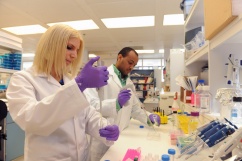The focus of PREP education and training is to help learners prepare for their current and/or future careers. This education and training is meant to fill a gap in accessibility and complement other programs, both academic and extra-curricular in the community.
Visit /faculty/prep/programs/education-training.html to register for our current training and education sessions.
There are 5 main areas of focus under PREP:
Funding
This module is meant to help you in your quest for research funding. Sessions offered under this module include:
- Finding Funding - identify sources of funding that apply to your area of research
- Grant-writing - obtain expert mentoring to understand and perfect various components of a research grant (e.g. abstract, lay summary)
- Other sessions can be developed as requested.
Career Development
This module offers education and training on specific areas of career development to help you reach your goals in this area. Specific sessions relate to both academic and non-academic careers:
- Career Preparation 101 - introduce learners to their career-related aptitudes and transferable skills.
- CV and Resume Development - know when to use which tool for the career you desire.
- Job Search - learn how to access the job market that is relevant to you.
- Academic Interview - learn what is expected and how to prepare for an interview in academia.
- Non-Academic Interview - prepare for an interview in a non-academic organization.
Further assistance with career development can be found through and the .
Research Management
Leading a research enterprise is similar to running a small business. These sessions aim to help you develop your abilities in essential areas:
- Interviewing & Hiring - build your team with the right mix of individuals.
- Employee Engagement & Motivation - when employees are engaged and motivated, everyone benefits.
- Managing Conflict - conflict is a regular part of doing business, but there are pilipiliĀž»ful ways to manage this challenge.
- Budgeting - keep track of your bottom line
- Mentoring - be a role model for trainees and provide them with the skills to mentor others in the future.
- Managing Intellectual Property - know your rights and responsibilities when it comes to your intellectual property.
- Time Management - manage your time effectively to get the most out of your day.
Communicate, Disseminate, Apply Research
What is the value of research, if it cannnot be effectively shared and added to the bank of knowledge? Ways to share research can use a variety of strategies:
- Effective Oral and Poster Presentations - communicating research through oral and poster presentations can be valuable ways to get your research out there, if done well.
- Media Skills - discussing your research in plain language can help gain support from those outside your field.
- Getting Published - obtain strategies to increase your publication pilipiliĀž».
- Knowledge Translation - your research should make an impact on your field.
Research Ethics & Conduct
Research is an essential activity to build knowledge, but there are responsibilities in its practice. To help navigate the area of ethics and responsibility in research, we offer sessions on:
- Responsible Conduct of Research - explore solutions to current, complex issues in research.
- Research Integrity - learn to avoid accidental scholarly misconduct in accordance with pilipiliĀž»'s .




